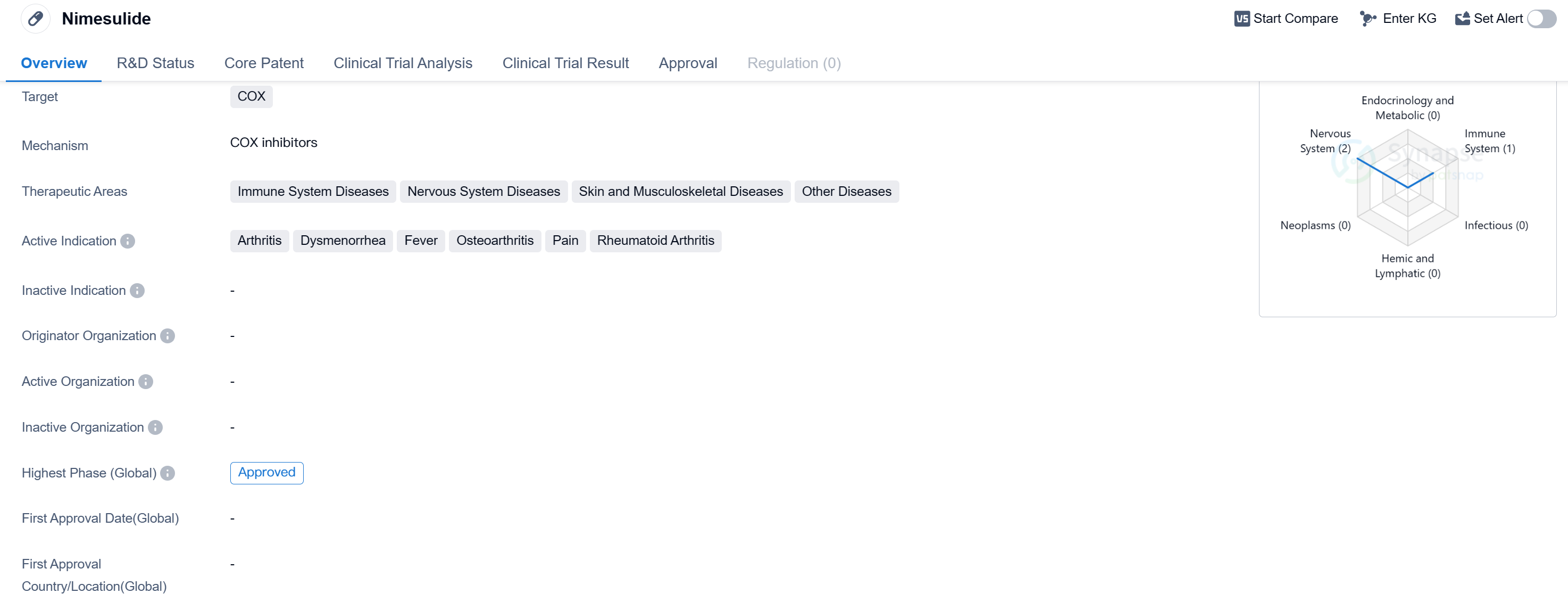A Comprehensive Review of Nimesulide's R&D Innovations and Drug Target Mechanism
Nimesulide's R&D Progress
Nimesulide is a small molecule drug that primarily targets COX, an enzyme involved in the production of inflammatory substances in the body. It has been approved for use in various therapeutic areas, including immune system diseases, nervous system diseases, skin and musculoskeletal diseases, and other diseases. The drug is indicated for the treatment of arthritis, dysmenorrhea (painful menstruation), fever, osteoarthritis, pain, and rheumatoid arthritis.
Nimesulide has reached the highest phase of development, which is approval globally. The approval suggests that Nimesulide has met the regulatory requirements and has demonstrated its therapeutic benefits.
As a small molecule drug, Nimesulide is likely to have a relatively small molecular size, allowing it to easily penetrate cell membranes and interact with its target, COX. By inhibiting COX, Nimesulide can reduce the production of inflammatory substances, thereby alleviating symptoms associated with immune system diseases, nervous system diseases, skin and musculoskeletal diseases, and other diseases.
The specific mechanism of action of Nimesulide in each therapeutic area may vary. For example, in arthritis and rheumatoid arthritis, the drug may help reduce joint inflammation and pain. In dysmenorrhea, it may alleviate menstrual cramps. In fever, it may help lower body temperature. In osteoarthritis, it may provide relief from joint pain and stiffness.
The approval of Nimesulide in global markets suggests that healthcare professionals can confidently prescribe the drug to patients in need. However, it is important to note that the use of Nimesulide should be in accordance with the approved indications and under the supervision of a healthcare professional.
👇Please click on the image below to directly access the latest data (R&D Status | Core Patent | Clinical Trial | Approval status in Global countries) of this drug.
Mechanism of Action for Nimesulide: COX inhibitors
COX inhibitors refer to a class of drugs that inhibit the activity of cyclooxygenase (COX) enzymes. These enzymes are responsible for the production of prostaglandins, which are hormone-like substances involved in inflammation, pain, and fever. By inhibiting COX enzymes, COX inhibitors reduce the production of prostaglandins, thereby providing relief from pain, inflammation, and fever.
From a biomedical perspective, COX inhibitors are commonly used as nonsteroidal anti-inflammatory drugs (NSAIDs) to treat various conditions such as arthritis, menstrual cramps, and acute pain. There are two main types of COX enzymes, COX-1 and COX-2. Traditional NSAIDs inhibit both COX-1 and COX-2 enzymes, while selective COX-2 inhibitors primarily target COX-2 enzymes.
COX inhibitors have analgesic, anti-inflammatory, and antipyretic properties, making them effective in managing pain and inflammation associated with various medical conditions. However, it is important to note that long-term use of COX inhibitors may have potential side effects on the gastrointestinal system, cardiovascular system, and kidney function. Therefore, these medications should be used under the guidance of a healthcare professional and in accordance with the prescribed dosage.
Drug Target R&D Trends for Nimesulide
According to Patsnap Synapse, as of 14 Sep 2023, there are a total of 598 COX drugs worldwide, from 597 organizations, covering 312 indications, and conducting 8112 clinical trials.
The analysis of the target COX reveals a competitive landscape with multiple companies actively developing drugs. GSK Plc, Viatris Inc., and Pfizer Inc. are the companies growing the fastest, with a significant number of drugs in the approved phase. The most common indications for these drugs are pain, common cold, and rheumatoid arthritis. Small molecule drugs are the most rapidly progressing drug type, indicating a focus on developing these types of drugs. China, the United States, and Japan are the countries/locations with the highest development progress, with China showing notable progress in both approved and preclinical drugs. Overall, the target COX market is competitive, with a strong emphasis on pain-related indications and small molecule drugs. The future development in this area is likely to continue focusing on these aspects, with potential contributions from emerging markets such as China.
👇Please click on the picture link below for free registration or log in directly if you have a freemium account, you can browse the latest research progress on drugs, indications, organizations, clinical trials, clinical results, and drug patents related to this target
 Conclusion
Conclusion
In summary, Nimesulide is a small molecule drug that targets COX and has been approved for use in various therapeutic areas, including immune system diseases, nervous system diseases, skin and musculoskeletal diseases, and other diseases. Its active indications include arthritis, dysmenorrhea, fever, osteoarthritis, pain, and rheumatoid arthritis. The drug has reached the highest phase of development. Healthcare professionals can consider Nimesulide as a potential treatment option for patients with the approved indications.





